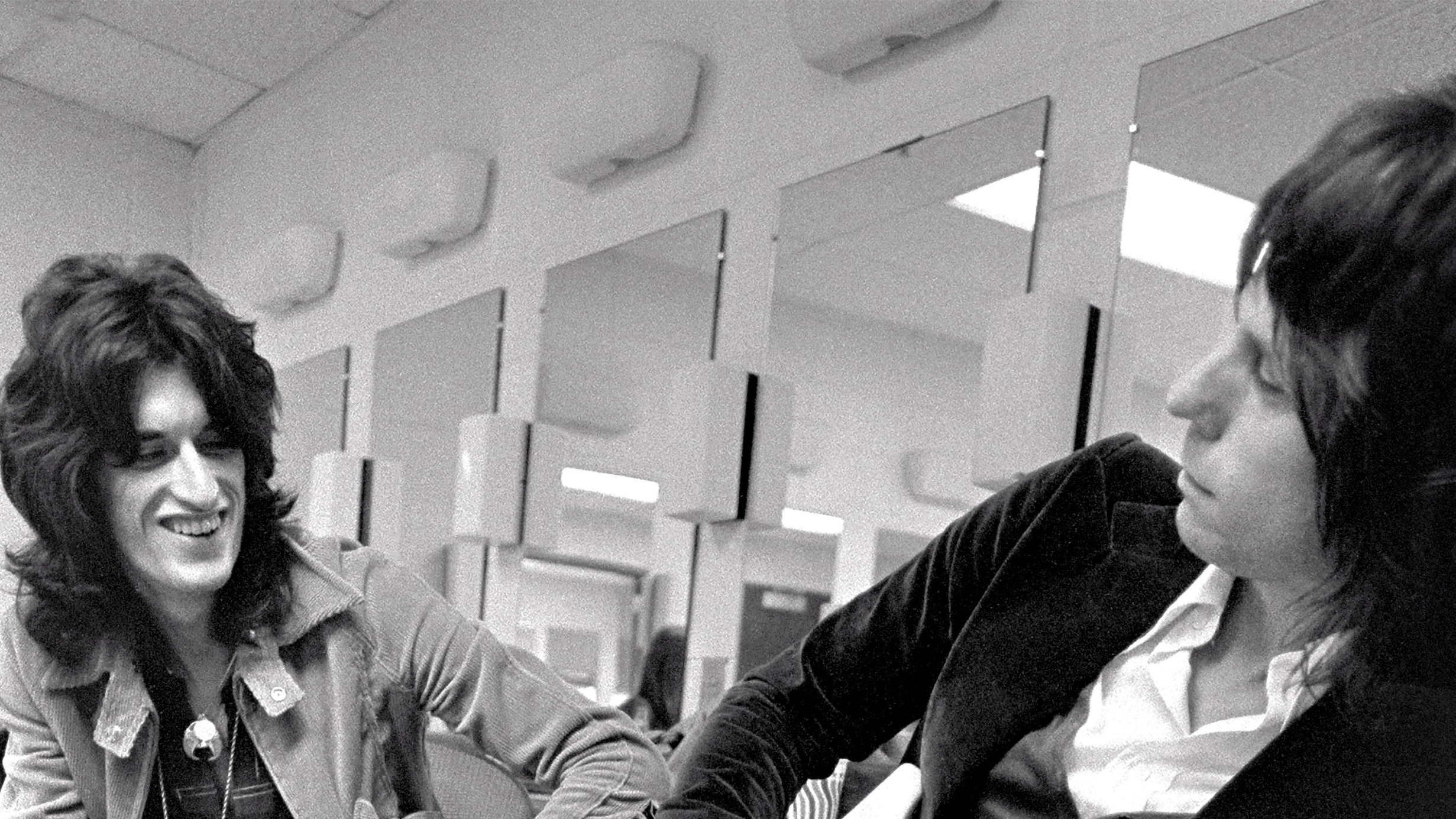“I was doing a gig, I dropped the pick, and I was drunk. I was afraid if I bent over to pick it up, I'd fall. So I played the rest of the show without the pick and started to really like it’”: What Jeff Beck told his friend Joe Perry
Beck’s guitars are up for auction this week

On January 22, a selection of Jeff Beck’s guitars and other items of gear will be auctioned by Christie’s in London.
Ahead of the auction, Aerosmith guitarist Joe Perry has told MusicRadar about his long friendship with Beck and the discussions they had about the tools of their trade.
Whenever you ran into Jeff on the road, what were your observations about the gear he traveled with?
“He had some cool guitars he traveled with that he'd picked up. I'm sure he had a bunch that was given to him over the years, but on the road, it was pretty much whatever current Custom Shop Strat he'd gotten from Fender. That was it.
“And with his pedalboard, in all the years I'd seen him play, he only had maybe two or three effects. I know he was using a Klon [overdrive] for a while. And he had a wah-wah pedal, and he'd use one of those voice box things with the tube [Talkbox]. I think he had an SPX90 Yamaha, the stereo delay in the '80s or '90s when everyone was using them.
How about amps?
“Every time I'd seen him, he'd usually have a Marshall and a Fender. That was it. One thing I know that he did is rather than have reverb coming from his amp he would have the reverb put on after the fact through the monitors.”
Want all the hottest music and gear news, reviews, deals, features and more, direct to your inbox? Sign up here.
Why do you think he did that?
“Because sometimes, when you're pushing the amp, when you have reverb on it, the reverb gets washed away. You only hear it when you stop playing, you know?
“But in the studio, when you've got your amp cranked, and then you put reverb on it, it sounds like you're playing in a room. It's like you're in an echo chamber.
“To get that, he would have the reverb come up through his monitors. So, his reverb was really, really present. I know that's one of the things he used to do.”
Of the things you observed, what other nuances impacted Jeff's tone?
“Another thing is—and we're talking about strings now—I'm pretty sure I heard him say he used .8s when he was around the house.
“All of us, you know, are getting older, and we're all starting to have our knuckles get bigger. So, to save wear and tear, he would use .8s when practicing around the house. But when he was on the road, he used .9s. I'm pretty sure that's accurate.”
After Jeff passed, you got to play one of his Strats on tour with the Hollywood Vampires…
“It was his number three [Stratocaster]. The whole premise of the Vampires was to pay homage to the guys who had passed on.
“I think we were going to have it on the road with Aerosmith, but when that [the band’s Peace Out farewell tour] got cancelled, I gave it back to Jeff's guitar tech.
“He's the guy helping the family put Jeff's stuff together for the auction. I think he might have given it [the Stratocaster] to Billy Gibbons to play just to keep it out on the road. I'm hoping to get a chance to play it again—but again, there's nothing special about it except that it was Jeff’s."
Jeff's iconic guitars ranged from his Oxblood Les Paul to his beat-up Tele to his many Strats. Which guitar do most associate him with?
“He really found his voice when he just stuck to the Strat, you know? With the variety of tones, there's just something about the Strat. The way it's set up with the volume knob right there and how the vibrato arm just falls right on your hand, that guitar was designed for him. And once he started playing the Strat exclusively, he never went back.
“Listening back to some of his recordings from when he was still using his Les Paul, compared to how his style kept evolving, he couldn't do a lot of the stuff he was doing without the vibrato arm. He used that like a musical instrument. It wasn't just an effect to dive bomb.”
No one really used a vibrato arm on a Strat quite like Jeff Beck.
“Even Jimi Hendrix didn't use it as musically as Jeff did. He really used it to make the guitar sound like he was playing slide. You couldn't tell the difference. He used it in a really musical way, and you couldn't do that with any other guitar.”
What was Jeff like off the stage?
“I think we spent more time in his garage than we did looking at guitars! If he wasn't playing, he was working on a hot rod. He had some close calls; he had some bad accidents and f**ked up his hands, you know? But he loved that whole '50s thing. He played great rockabilly.”
Jeff played a lot of that fingerstyle in a way that's unique to him. He played with a pick early on but switched to fingerstyle later. Did he ever mention why?
“I said to him, 'Why get rid of the pick?' He said, 'Well, one night, I was doing a gig, I dropped the pick, and I was actually kind of too drunk. I was afraid if I bent over to pick it up, I'd fall. So, I played the rest of the show without the pick and started to really like it.' That's what he told me.”
“I don't know if it went like that, but he liked to play all that rockabilly stuff and shit. He said, 'I can do a lot more of that without a pick,' so he just stuck with it.
“When he played without a pick, his thumb was his main hammer. A lot of times, when you play without a pick, if you're used to playing with a pick, it's a combination of your pointer [index] finger and your thumb. But he pretty much relied on his thumb.”
What can we learn from Jeff's reliance on relatively common guitars?
“I mean… that's what he chose to play live. I think that says a lot. Obviously, it was about the music. He was able to get what he needed out of the latest, greatest Strat from the Custom Shop. I don't think he was attached to them the way a lot of us are to our particular guitars. I don't think there was one particular guitar he had on the road with him all the time that was number one.”
It was more about the player than the gear, right?
“He had the Noiseless pickups and whatever odds and ends they did at the Custom Shop, but there's nothing special about the guitars. I don't think he was concerned about it, though I'd imagine he'd play all his vintage stuff in the studio.
“But whenever I'd see him play live for real, you know, it was an off-the-rack Strat. He was never one to say, 'I've got to play that. That's my number one. That's the one I can't live without.’ I think that was interesting. He looked at the guitars like tools, not something you get attached to.”
Andrew Daly is an iced-coffee-addicted, oddball Telecaster-playing, alfredo pasta-loving journalist from Long Island, NY, who, in addition to being a contributing writer for Guitar World, scribes for Rock Candy, Bass Player, Total Guitar, and Classic Rock History. Andrew has interviewed favorites like Ace Frehley, Johnny Marr, Vito Bratta, Bruce Kulick, Joe Perry, Brad Whitford, Rich Robinson, and Paul Stanley, while his all-time favorite (rhythm player), Keith Richards, continues to elude him.
